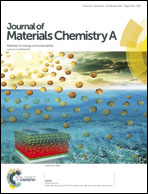Coke-free operation of an all porous solid oxide fuel cell (AP-SOFC) used as an O2 supply device†
Abstract
Suppressing carbon deposition is crucial for operating solid oxide fuel cells (SOFCs) in dry hydrocarbon fuels. To prevent flammability and carbon deposition issues, a novel all porous SOFC (AP-SOFC) was developed as an O2 supply device. In the present work, cell performances were studied using an anode-supported thin-film Gd0.1Ce0.9O1.9 (CGO) configuration prepared by dry-pressing. The cell performance in a CH4–He mixture was improved over 14 times compared to an all porous electrolyte-supported SOFC. The peak power density of 183 mW cm−2 was obtained with 112 μm CGO porous electrolyte at 700 °C. The long-term operational stability of the AP-SOFC was investigated with CH4 and C3H8 under OCV conditions and with CH4 under a constant current of 450 mA cm−2. The anode-supported AP-SOFC was stable in CH4 fuel for at least 10 days without observable coking of the anode. This indicates that the operation of an AP-SOFC in hydrocarbon fuels is a feasible process. An additional advantage of such a process is improved safety, due to the distribution of O2 along the anode.


 Please wait while we load your content...
Please wait while we load your content...